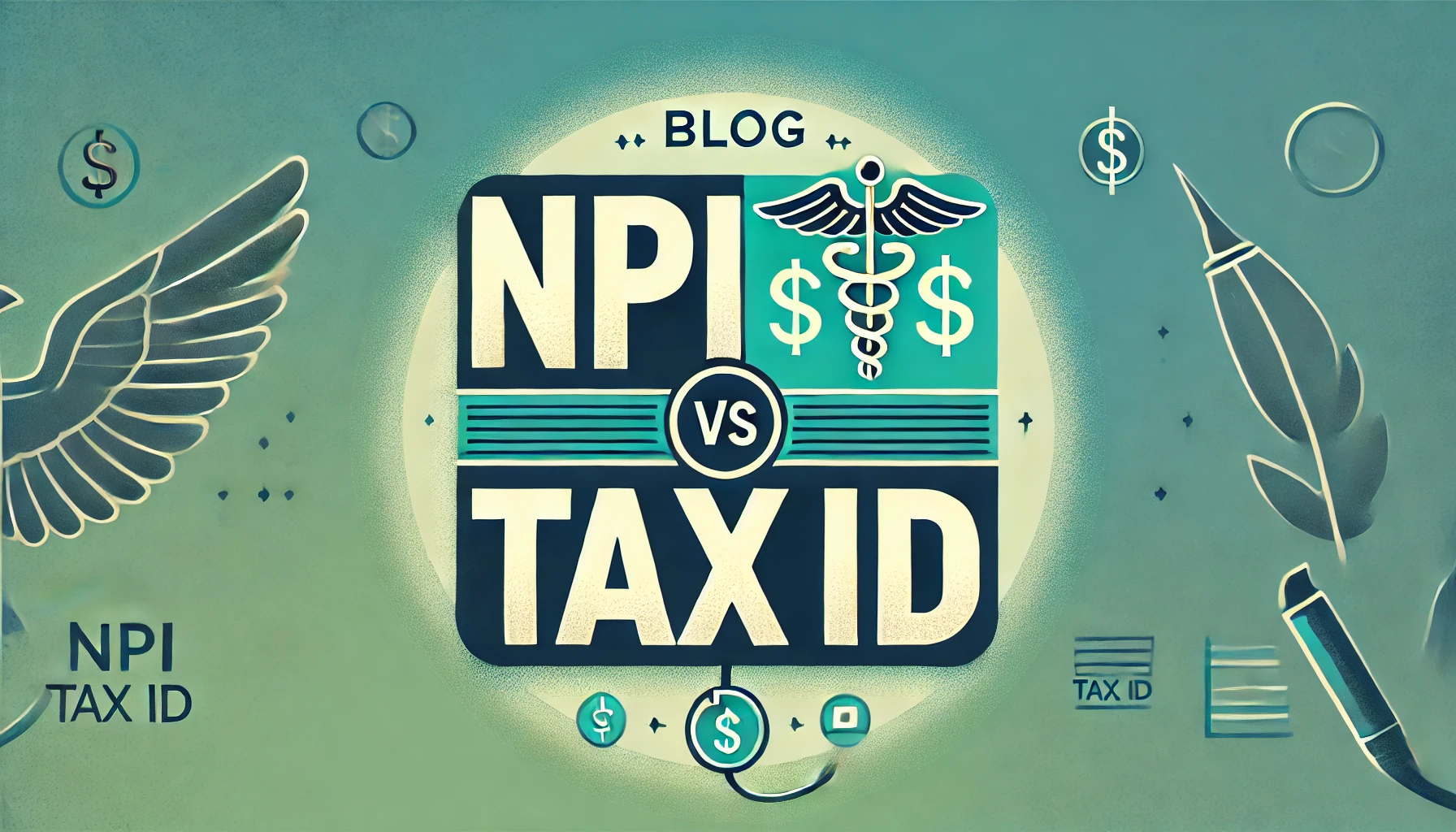NPI vs Tax ID
NPIs and TINs play distinct roles in healthcare. The NPI, a unique 10-digit number assigned by CMS, standardizes provider identification for billing and administrative tasks. The TIN, issued by the IRS, is crucial for tax reporting and financial transactions. This article delves into the creation, types, applications, and significance of both identifiers, emphasizing their contributions to enhancing efficiency and compliance within the healthcare system.
Abhinil Kumar
Author

In the healthcare industry, both the National Provider Identifier (NPI) and Tax Identification Number (TIN) are essential for various administrative and financial transactions. Understanding the differences and specific uses of each is crucial for healthcare providers, administrators, and other stakeholders.
What is an NPI?
The National Provider Identifier (NPI) is a unique 10-digit identification number assigned to healthcare providers in the United States by the Centers for Medicare & Medicaid Services (CMS). Implemented in 2006, the NPI is used to simplify and standardize healthcare provider identification across the country.
Why It Was Created:
The CMS created the NPI to replace older identification systems such as the UPIN (Unique Physician Identification Number) and the NSC (National Supplier Clearinghouse) number. This move aimed to reduce errors and fraud, improve the efficiency of electronic health records (EHRs), and streamline healthcare transactions.
Types of NPIs:
There are two main types of National Provider Identifier (NPI) numbers: individual NPI numbers and organizational NPI numbers. These numbers are used to identify and track healthcare providers and entities in the United States.
- Individual NPI: An individual NPI number is assigned to healthcare providers who perform services independently. This would include doctors, nurses, therapists, and other individual practitioners. The purpose of an individual NPI number is to uniquely identify each healthcare provider and link them to their specific services and billing information. It is crucial for the accurate and efficient processing of healthcare claims and reimbursements.
- Organizational NPI: Organization NPI number is assigned to business entities, such as hospitals, clinics, and medical practices, rather than to individual practitioners. This number identifies the business entity as a whole rather than individual practitioners within it.
How to Obtain an NPI:
To obtain an NPI, healthcare providers need to apply through the NPPES (National Plan and Provider Enumeration System) website. The application requires basic information about the provider, including personal and practice details.
Requirements for obtaining an NPI
To obtain a National Provider Identifier (NPI), individuals can apply as an individual provider or on behalf of a group practice through the NPI website. The NPI is a unique 10-digit identification number used in the healthcare industry. There are two types of NPIs: type 1 for individual providers and type 2 for group practices.
For individual providers, the requirements to obtain an NPI include providing personal identification information such as name, date of birth, and social security number. Additionally, individuals will need to submit details about their practice location, specialty, and any additional licenses or certifications they hold.
Group practices, on the other hand, must designate an authorized official to apply for the NPI on behalf of the practice. This authorized official will need to provide personal and contact information, as well as details about the group practice, including the name, address, and Tax Identification Number (TIN).
It is crucial to obtain an NPI as it is required for credentialing with insurance companies and billing insurance claims. Without an NPI, providers, and group practices cannot bill insurance companies or receive reimbursements for services rendered. Insurance companies rely on NPIs to accurately identify and process claims, ensuring proper coordination of benefits and payments.
Importance in Healthcare:
NPIs are crucial for:
- Filing insurance claims
- Electronic health records (EHRs)
- Credentialing with insurance companies
- Streamlining administrative processes

Difference between NPI and TAX ID
What is a Tax ID?
A Tax Identification Number (TIN), also known as an Employer Identification Number (EIN), is a unique nine-digit number issued by the Internal Revenue Service (IRS) for tax purposes. It is used to identify businesses, nonprofit organizations, and other entities.
Why It Was Created:
The IRS created the TIN/EIN to facilitate tax reporting and ensure accurate identification of entities for tax purposes. It is essential for filing taxes, opening business bank accounts, hiring employees, and applying for business licenses.
Types of Tax IDs:
- Social Security Number (SSN): A Social Security Number (SSN) is a unique nine-digit number issued to U.S. citizens, permanent residents, and temporary (working) residents under section 205(c)(2) of the Social Security Act. The primary purpose of an SSN is to track individuals for Social Security purposes, but it has become a de facto national identification number for various other purposes, such as taxation, credit reporting, and identification in financial transactions. The SSN is used by individuals to report their earnings to the Social Security Administration and to track their benefits. It is also required when filing individual tax returns with the Internal Revenue Service (IRS).
- Employer Identification Number (EIN): An Employer Identification Number (EIN), also known as a Federal Tax Identification Number, is a unique nine-digit number assigned by the IRS to business entities operating in the United States for the purposes of identification. An EIN is used by businesses, nonprofits, and other organizations for tax filing and reporting purposes. It is required for most business activities, such as hiring employees, opening business bank accounts, applying for business licenses, and filing business tax returns. An EIN helps separate the business’s financial activities from the personal finances of the owners, ensuring clear and distinct financial and tax records.
How to Obtain a Tax ID:
Businesses and organizations can apply for an EIN through the IRS website. The application requires detailed information about the business, including its structure, purpose, and owner details.
Importance in Healthcare:
TINs are critical for:
- Filing tax returns
- Billing insurance companies
- Credentialing with insurance providers
- Ensuring compliance with tax regulations
Conclusion
In conclusion, understanding the distinction between NPI (National Provider Identifier) and Tax ID (Tax Identification Number) is crucial for healthcare providers and businesses involved in the healthcare sector. The NPI is primarily used to identify healthcare providers in administrative and billing transactions, ensure accurate and efficient claims processing, and facilitate seamless interactions with health plans. On the other hand, the Tax ID, including Social Security Number (SSN) for individuals and Employer Identification Number (EIN) for businesses, is essential for tax reporting, billing provider tax purposes, and other financial transactions. By recognizing the unique roles and applications of NPIs and Tax IDs, healthcare providers can navigate the complex healthcare system more effectively and ensure compliance with regulatory requirements.
FAQs
Q1: What is the purpose of a National Provider Identifier (NPI)? A: The NPI is a unique 10-digit identification number used to identify individual health care providers and organizations in administrative and billing transactions, ensuring accurate claim processing and provider identification.
Q2: How do NPIs differ from Tax Identification Numbers (Tax IDs)? A: While NPIs are used for identifying healthcare providers in the provider database and electronic transactions, Tax IDs (SSNs for individuals, EINs for businesses) are used for tax reporting, business licenses, and billing provider tax purposes.
Q3: Why is an NPI required for healthcare providers? A: NPIs are required to standardize provider IDs, facilitate claim status inquiries, and ensure seamless communication between healthcare providers and health plans, enhancing overall efficiency in healthcare transactions.
Q4: Can a healthcare provider use their Social Security Number (SSN) instead of an NPI? A: No, healthcare providers must use an NPI for all healthcare-related transactions. SSNs are used for tax purposes, while NPIs are used for identifying healthcare providers in claims and other administrative processes.
Q5: What are the key benefits of having an NPI for a healthcare provider? A: An NPI simplifies the claim submission process, improves accuracy in the provider field, enhances coordination among health plans, and ensures compliance with the Health Insurance Portability and Accountability Act (HIPAA).


